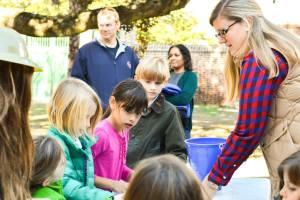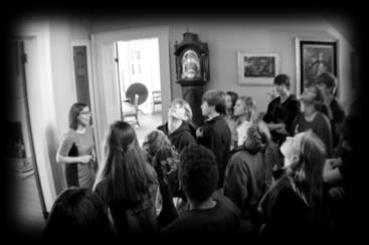
Make social studies come alive with one of the programs offered by the Education team at Historic Charleston Foundation. Come visit our historic house museums on a field trip, rent a traveling trunk full of artifacts and lesson plans, or invite one of our staff members to come to your classroom as a historian-in-residence to teach fun and engaging classes to your students.
www.HistoricCharleston.org
In-Class Experiences:
Historic Charleston Foundation offers many different programs that can be taught in your classroom by a member of our Education Team. Having trouble making any of the Social Studies standards fun and engaging? We are here to help with hands on activities, lessons, and crafts.

Historian-in-Residence: Bring in a historian educator to lead one class activity or for a whole week with themes relating to the American Revolution, Gullah culture, archaeology, pirates, Civil War, slavery, cash crops, and more. Our classes are very hands on and teach the standards while incorporating theatre, visual arts, and games. Have a standard that you need help with that is not on our list? Ask us about it and we can teach it! Click here for a class list.
Colonial Toys & Games (K-2nd)
Children in the 18th and 19th centuries had to make their own fun and games. We will discuss what it would have been like to live in the past and different changes that have been made in transportation, communication, technology, and more over time. Students might be surprised how fun it is to pretend to be a kid in the past without any electronics to play with. They will play period games and make their own colonial toy to keep.
Act out the Civil War in South Carolina (3rd and 4th)
Students will explore what happened in South Carolina during the Civil War by stepping back in time and acting out major events. Scenes include: the Secession Convention, firing on Fort Sumter, the Hunley submarine, Emancipation Proclamation, and Sherman’s march through SC. Students will break up into groups to play their part as some students will act and some will direct. They will then perform the scenes for the class in costume.
Life of a Soldier (3rd and 4th)
What was it like to be a soldier in the American Revolution or Civil War? Learn about these conflicts and major battles, read a letter written by a real solider, do some marching drills, then write your own letter talking about what it is like to be in the war. The teacher may choose which war for us to focus this class on.
 Real Pirates of Charleston (K-3rd)
Real Pirates of Charleston (K-3rd)
Did you think pirates were just in the movies and on tv? No! Students will learn about real pirates like Blackbeard and the “Gentleman Pirate,” Stede Bonnet, who wreaked havoc on Charleston. They will go on a treasure hunt and make their own pirate flag to take home.
Field Trips:
 Below are the most popular field trips for school groups. Students will get to explore historic house museums and the downtown historic district.
Below are the most popular field trips for school groups. Students will get to explore historic house museums and the downtown historic district.
Antebellum South Carolina: In this field trip, students will visit both the Nathaniel Russell House (c. 1808) and Aiken-Rhett House (c. 1820) to get a complete picture of what Antebellum South Carolina was like up through the Civil War. Learn about daily life, economic classes, slavery, politics, and more! This program is designed for 3rd grade and 8th grade social studies standards, but suitable for any classes studying South Carolina or early American history. Field trip includes on hands on activities and a scavenger hunt. Click to view the teacher packet.
 Children and Families of the Past: In this field trip, students will visit both the Nathaniel Russell House (c. 1808) and Aiken-Rhett House (c. 1820) to get understand what it was like to be a kid in the past. Learn about daily life, technology, transportation, entertainment, and more! This program is designed for K-2nd grade social studies standards and students will get to play games from the past and complete a scavenger hunt. Click to view the teacher packet.
Children and Families of the Past: In this field trip, students will visit both the Nathaniel Russell House (c. 1808) and Aiken-Rhett House (c. 1820) to get understand what it was like to be a kid in the past. Learn about daily life, technology, transportation, entertainment, and more! This program is designed for K-2nd grade social studies standards and students will get to play games from the past and complete a scavenger hunt. Click to view the teacher packet.
King Charles to King Cotton South Carolina 1670-1860
Field Trip Experience: Historic Charleston Foundation’s Nathaniel Russell House has teamed up with The Powder Magazine and Old Slave Mart Museum to offer an educational field trip program that explores 200 years of Charleston history right where it happened. This field trip is designed for South Carolina Public Schools, is curriculum based, and includes hands on activities and a scavenger hunt that connects the three sites. Click to view the teacher packet.
TRAVELING TRUNKS
Teachers can help make their Social Studies lessons come alive
with the help of Historic Charleston Foundation’s new traveling trunk program. We have three trunks available for teachers to check out for a week full of artifacts, books, movies, and lesson plans. Check out the pictures for descriptions.
Traveling Trunks: Rent out one of HCF’s traveling trunks to use in your classroom for an entire week or longer to help students connect to your social studies lesson plans. Each trunk is filled with artifacts, lesson ideas, books, multimedia, games, and activities for you to use in conjunction with your social studies classes. We have trunks available for grades K-8 and you can reserve a trunk and combine it with a field trip or Historian-in-Residence class for a complete experience. To learn more about what trunks we have click here.
 American Revolution for 3rd, 4th, and 8th grades. This trunk covers the Revolutionary War in SC and in the other colonies. See what the life of a soldier was like, analyze political cartoons, write with a quill and ink, and crack Washington’s secret code. Inside are reproduction soldier items, a tricorn hat, fife sticks, Declaration
American Revolution for 3rd, 4th, and 8th grades. This trunk covers the Revolutionary War in SC and in the other colonies. See what the life of a soldier was like, analyze political cartoons, write with a quill and ink, and crack Washington’s secret code. Inside are reproduction soldier items, a tricorn hat, fife sticks, Declaration
of Independence, quill pens, ink, political cartoons, books, a DVD set, colonial currency, and more.
Gullah Culture (2nd-4th, 8th) 
Students will learn about this special culture that is unique to the low-country by watching a video with native Gullah descendants, listening to some Gullah stories, and creating their own traditional craft out of clay. Art, food, language, history, and music are all important parts of this culture that shapes Charleston and the Sea Islands.
Cash Crops of Carolina (3rd and 8th)
Charleston in the Colonial and Antebellum times was a prosperous port city and place where crops were king. Cotton, indigo, and rice were all staple crops to the economy of the lowcountry and what many enslaved Africans were forced to cultivate every day. Students will experience one small aspect of what the slaves had to do as they dye with indigo, pound rice, and clean cotton by hand without Eli Whitney’s cotton gin. They will hear an account from Solomon Northup, a free black who was captured and put into slavery.
Archaeology & Daily Life Designed for Kindergarten, 1st and 2nd grades.
This trunk teaches students about life in the past and how it was different from life today. Inside are real artifacts uncovered in digs, daily use objects from the 19th century, and period toys and games.
Digging Archaeology (K-3rd)
Can you dig it? Students will learn all about how archaeological investigations work and the science behind this exciting field. Students will search for artifacts outside around the school and try to figure out what they were once used for. When all the artifacts have been found, they will identify what they are and draw them on an identification card. Next they will have the chance to make their own artifacts.





